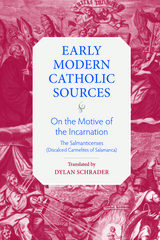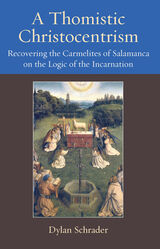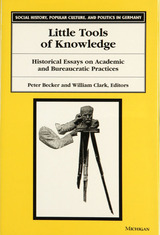3 books about Schrader, Dylan

Mary, Mother of God's Word Made Flesh
Dylan Schrader
Catholic University of America Press, 2025
Mary, Mother of God’s Word Made Flesh overviews Catholic teaching on Mary, with a special focus on the “four Marian dogmas” and other major doctrines, such as Mary’s cooperation in the work of salvation and the distribution of graces. The book takes the relationship of Mary to Jesus as its starting point, while also drawing on insights from ecclesio typical and Christotypical approaches to Mariology.
This book emphasizes that Marian doctrine must be grounded in the revealed Word of God. Thus, it does not rely on private revelations but instead draws on scriptural, magisterial, patristic, and liturgical sources. At the same time, Mary, Mother of God’s Word Made Flesh is systematic and not merely historical. It strives to show how Catholic teachings on Mary fit together and explores precisely what they mean.
In this task, Mary, Mother of God’s Word Made Flesh draws in a special way on St. Thomas Aquinas and the Thomistic school, while also incorporating insights from other approaches. Thus, it also engages with some speculative questions that have not received as much attention in other recent works of Mariology but that remain important for the correct understanding and elaboration of magisterial teachings. For example, it deals with the issue of the debitum peccati (“debt of sin”), which touches on how to connect the Immaculate Conception with the notion of redemption, and the question of precisely how Mary is involved in the conferral of graces.
The most important parts of this book are the chapters on the dogmas of the divine maternity, the immaculate conception, the perpetual virginity of Mary, and her assumption into heaven. There are also chapters on Mary’s holiness of life, her participation in Christ’s saving work, and Marian devotion in the life of the Church. The first appendix overviews the problem of what St. Thomas Aquinas taught about the Immaculate Conception, while the second discusses the magisterium’s current approach to private revelations and extraordinary phenomena.
[more]

On the Motive of the Incarnation
Dylan The Salmanticenses
Catholic University of America Press, 2019
The Catholic University of America Press is pleased to announce a new series, Early Modern Catholic Sources, edited by Ulrich L. Lehner and Trent Pomplun. This series – the only one of its kind – will provide translations of early modern Catholic texts of theological interest written between 1450 and 1800.
The first volume in this series is On the Motive of the Incarnation, the first English translation of the seventeenth-century Discalced Carmelites at the University of Salmanca treatise on the motive of the Incarnation. Originally intended for students of their order, it became a major contribution to broader theological discourse. In this treatise, they defend the assertion that God intended Christ’s Incarnation essentially as a remedy for sin, such that if Adam had not sinned Christ would not have become incarnate, and that, at the same time, God intended all other works of nature and grace for the sake of Christ at their end. The Salmanticenses’ position thus combines elements of the Franciscan and Dominican traditions, stemming from the thought of Blessed John Duns Scotus and Saint Thomas Aquinas. This treatise is an exhaustive effort to show how the Scotistic emphasis on the primacy of Christ as the first willed and intended by God can be articulated within a Thomistic framework that acknowledges the contingency of the Incarnation on the need for redemption. In addition to the translation, the volume will include a brief introduction and extensive notes for theologians, historians, and students.
[more]

A Thomistic Christocentrism
Recovering the Carmelites of Salamanca on the Logic of the Incarnation
Dylan Schrader
Catholic University of America Press, 2021
Saint Thomas Aquinas famously held the opinion that, in God’s actual plan for the world, the Word would not have become flesh except to redeem us from sin. Conversely, Blessed John Duns Scotus argued that God intended Christ first, such that Christ would have come even if there had been no sin. While Aquinas and Scotus were far from the first to consider this question, they became emblematic of two seemingly irreconcilable approaches. In this book, Father Dylan Schrader recovers the thought of the Salmanticenses, the Discalced Carmelites writing at the University of Salamanca in the seventeenth century. The Salmanticenses argue that Christ is primary in God’s intention precisely as redeemer, so that it is true both that God has made everything else for the sake of Christ and that Christ’s coming is essentially redemptive, connected with sin. In this way, the Salmanticenses offer a Thomistic Christocentrism.
This book summarizes the historical background to the Salmanticenses, from the time of Anselm up through the early-modern period. Next, it presents and defends the Salmanticenses’ argument for the primacy of Christ the redeemer. A Thomistic Christocentrism then turns to two key post-conciliar figures, Karl Rahner and Hans Urs von Balthasar. Rahner sees Christ as the culmination of the world’s opening up to God. Balthasar sees Christ as the reconciler of divine and human freedom through his cross, descent, and resurrection. Both Christocentric approaches have good aspirations but suffer from serious flaws. In its final chapters, this book applies the Salamanca theory to Rahner and Balthasar, showing its enduring value for post-conciliar Christocentrism.
[more]
READERS
Browse our collection.
PUBLISHERS
See BiblioVault's publisher services.
STUDENT SERVICES
Files for college accessibility offices.
UChicago Accessibility Resources
home | accessibility | search | about | contact us
BiblioVault ® 2001 - 2025
The University of Chicago Press









